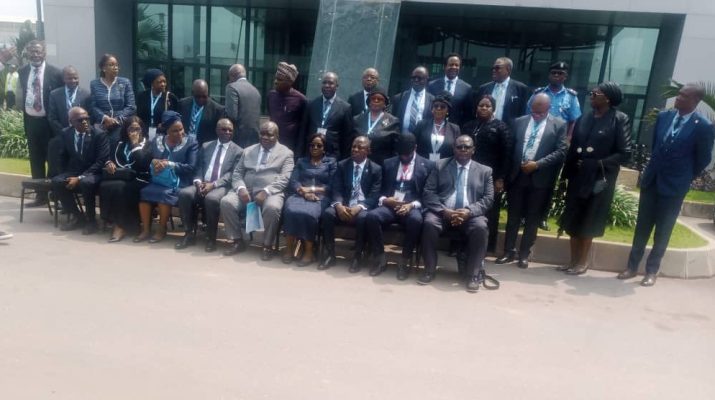Sector’s Huge Resources Capable Of Exceeding $3 Trillion Globally By 2030
By Edu Abade
Experts and stakeholders in Nigeria’s Marine and Blue Economy sector have predicted an exponential growth for the country’s Blue Economy, saying that the huge opportunities in the industry spanning oil and gas exports, shipping, marine tourism, fisheries and ocean energy represent Nigeria’s next economic frontier capable of exceeding $3Trillion by 2030.
Director-General of the Nigerian Maritime Administration and Safety Agency (NIMASA), Dr. Dayo Mobereola, who spoke in Lagos at the Fourth Nigerian Admiralty Law Colloquium with the theme: Charting the Course For Nigeria’s Blue Economy, stated that due to its huge potential of generating wealth and creating prosperity for millions of Nigerians, the Blue Economy requires the synergy of all stakeholders and the judiciary.
In his welcome address at the event, he said, “Nigeria’s blue economy requires an “all hands on deck” approach, with the Judiciary as a crucial actor, where interpretation of legal instruments and case decisions remains a vital tool for the sustainable development of Nigeria’s blue economy.”
Mobereola equally revealed that NIMASA remains committed to realizing the lofty goals and was working tirelessly to secure and advance Nigeria’s blue economy through continuous development of strategies, approaches and mechanisms that balance economic and growth of the sector.
He also disclosed that some of the key initiatives include the review and update of existing regulatory frameworks in alignment with global best practices; ratification and domestication of key International Maritime Organization (IMO) and International Labour Organization’s (ILO) conventions and protocols; and enhancement of maritime safety and security through the Deep Blue project, which secures Nigerian waters and has ensured zero piracy on Nigerian waters in the last three years.
In her keynote address, Chief Justice of Nigeria (CJN), Justice K.M.O. Kekere-Ekun, said the colloquium was timely and significant, maintaining that the discourse on the Blue Economy must focus on sustainable use of ocean resources for economic growth, improved livelihoods and environmental health, which she said, has assumed a central place in national development strategies.
Kekere-Ekun, who was represented by Justice Emmanuel Agim, explained that for a maritime nation such as Nigeria, endowed with an expansive coastline, a network of navigable inland waters and a strategic geo-location that positions the country as a maritime hub in the Gulf of Guinea, “our ability to effectively govern, regulate and adjudicate within this domain is critical to our economic diversification and national prosperity.”
Speaking further at the colloquium organized by NIMASA in collaboration with the Nigeria Institute of Advanced Legal Studies (NIALS) and the National Judicial Institute (NJI), she said, “The concept of the blue economy extends beyond the traditional view of oceans and waterways as merely navigable routes.
“It encompasses a sustainable and integrated approach to harnessing marine resources, driving economic growth, creating employment, enhancing food security, promoting environmental stewardship and supporting technological innovation. It includes sectors such as shipping and maritime transport, fisheries and aquaculture, offshore oil and gas, marine biotechnology, coastal tourism, renewable ocean energy and maritime security.
“Globally, the blue economy is projected to be worth over $3 trillion by 2030. Nigeria occupies a central position in West and Central African maritime trade corridors. Over 90 percent of our import and export activities rely on maritime transport. Additionally, our Exclusive Economic Zone (EEZ) spans approximately 200 nautical miles into the Atlantic, as well as endowed with hydrocarbon deposits, fisheries and other marine biodiversity.”
She stated that for Nigeria, a maritime nation whose economy has historically relied on land-based and offshore hydrocarbon revenue sources, its blue economy presents a viable frontier for national diversification, adding that in the era of dwindling oil revenue and the urgent need for sustainable economic transformation, it offers new pathways for long-term growth and development.
“Keying into these benefits, Nigeria has recently taken several steps, especially under the President Bola Ahmed Tinubu’s administration, to harness the country’s maritime-related resources for economic growth and job creation. The creation of the Ministry of Marine and Blue Economy, which has the mandate to harness the country’s vast marine resources for sustainable economic growth, improved livelihood and job creation, is a testament to the present administration’s focus.
“Harnessing the full benefits of Nigeria’s maritime endowment faces persistent challenges, including illegal, unregulated, and unreported fishing; oil theft and pipeline vandalism; piracy and armed robbery against ships; environmental degradation; weak regulatory enforcement; and inadequate judicial understanding of maritime and admiralty law.
“There is the need to continuously engage with relevant stakeholders to surmount these challenges. Indeed, establishing a sustainable and efficient blue economy requires an integrated institutional response, supported by a judiciary that is not only independent but also knowledgeable and agile in handling maritime-related disputes.
“The judiciary, though not a direct participant in maritime trade or resource exploitation, occupies a pivotal role in ensuring that the framework supporting the Blue Economy is founded on law, order and justice. Commerce thrives where the rule of law is strong, where disputes are resolved efficiently and where judicial interpretation provides clarity and predictability.
“Our courts are the custodians of maritime jurisprudence-from the enforcement of contracts for carriage of goods by sea, to issues of marine insurance, ship arrest, pollution control, piracy, and now, emerging frontiers such as offshore renewable energy and marine biotechnology,” she stated.
Stressing that the maritime sector remains unique due to its transnational nature, adjudicating matters requires the urgency that matches the speed of commercial transactions and the technical complexity of disputes, adding that admiralty matters often require specialized knowledge, comparative legal appreciation and familiarity with international conventions.
“It is, therefore, incumbent upon us, as the custodians of jurisprudence, to possess a firm grasp of maritime law principles, both domestic and international, and to apply them in a manner that fosters confidence in Nigeria’s maritime legal environment.
“Nigeria’s legal framework governing maritime activities is rooted not only in domestic legislation such as the Nigerian Maritime Administration and Safety Agency Act, the Admiralty Jurisdiction Act, the Cabotage Act, the Merchant Shipping Act, and environmental statutes, but also linked to the United Nations Convention on the Law of the Sea (UNCLOS); MARPOL Convention on marine pollution; SOLAS on safety of life at sea and various IMO conventions, among others,” she added.
Also speaking, Chief Justice of the Federal High Court, Justice John T. Tsoho, who was represented by Justice Olayinka Faaji, reaffirmed the court’s constitutional mandate in admiralty matters. He emphasized that the Blue Economy, spanning shipping, marine tourism, fisheries and ocean energy is Nigeria’s next frontier.
He therefore tasked judges on judicial foresight, precision, and alignment with international protocols, saying, “Our judges must be abreast of global best practices. This colloquium is vital for continuous judicial education”
He also stressed the importance of efficient dispute resolution in attracting Foreign Direct Investments (FDIs), adding, “Investors need confidence that their assets and contracts are protected by a predictable and sophisticated legal system. The rule of law is the compass guiding the success of Nigeria’s maritime sector.”
In his intervention, the National Judicial Institute (NJI) Administrator, Justice Babatunde Adejumo, whose address dwelled on Admiralty Law Demands Specialized Understanding, underscored the complexity of admiralty law, which intersects international conventions, environmental regulation, and commercial contracts.
“Maritime disputes are not conventional. They involve charter parties, bills of lading, marine insurance and cross-border claims and as such, judges must be equipped to navigate these waters,” Adejumo said, while commending the organizers of the colloquium, especially NIMASA for its ‘generous’ support, describing it as a rare forum for cross-sector dialogue, promoting consistency in judicial reasoning and enhancing Nigeria’s maritime governance.




